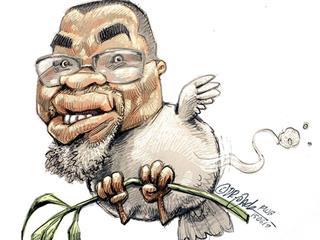
I would much rather have a conversation with farmers than make a speech. When people talk from a grievance-based platform, the consequence is an unproductive complaints session, which in my experience often ends in conflict. My personal view is that we are beginning to talk to one another, not past each other as we did before. This is what we expect in a conversation in which we focus on content.
We all know there are issues on the table that need to be discussed; farmers should never sulk and say: “We are angry.” It’s your sector; you must be forthcoming and sponsor ideas on an ongoing basis. There is only one certainty – that change is inevitable – and nothing else is cast in stone. We know that you [white commercial farmers] understand farming and that through the process of engaging your ideas, you do influence policy formulation in the ANC.
An emotional issue
The ANC is clear on the importance of agriculture, on farmers and on the need to talk to farmers. We recognise that transformation in the sector must be founded on sensible economic strategies. But the history of our country means that there is also an emotional component to land reform and transformation, and I ask you to recognise this.
When we first spoke to white farmers and were in discussion with TAU, they told us we had enough land to farm in the homelands and rural areas. I asked them why they thought we should be subsistence farmers and leave the commercial sector of agriculture to white farmers. Black farmers, too, have hopes of becoming commercial farmers. I am running a small farm today, but I want my farm to grow.
Within agriculture, many who were disadvantaged see change as coming too slowly, while many who were privileged see change as a carrier of threat and uncertainty, moving too fast. Let’s talk from a perspective of reality: there is a theory that agriculture is following a path towards mega farms and corporate farms.
This may be so, but those who are entering the terrain start as individual small- scale farmers and may have dreams of becoming mega farmers. You have some responsibility towards us [black farmers] as new entrants to the sector. The starting point for any farmer is access to land, without which one cannot farm.
We need rational heads to come together in this debate, otherwise it will be negotiated by extremists, the inevitable result of which will be the Zimbabwe model. The one extreme gives us a scenario of taking land without compensation, and the other extreme is to maintain the status quo. Neither of these will work, which is why it is so important for rational people to engage with each other and work out a formula for change.
If this is not done, extremists will dominate – and extremes always end up in conflict because nobody talks. Negativity is a bugbear of mine, and I believe that negative narratives must be challenged every time they come up. For instance, the adage that giving black people access to land will destroy food security is one such narrative.
When people are dispossessed and driven off the land, two things happen: loss of skills and destruction of a relationship with land. You can’t have farming skills unless you farm, and you can’t farm unless you have access to land. People will not have the skills until they have access to land.
My own son has a BSc (Agric), but in reality he knows very little with this degree. Only once he has hands-on experience will he be a better farmer. At the moment he has an internship with wool growers who are teaching him about real-life farming. This is the rational process: access land, access agriculture, engage with other farmers, and then you can grow.
Land ceilings: an artificial debate
Recent announcements in the state-of-the-nation address and various ministerial speeches about decisions around land ceilings of 12 000ha or not more than two farms have given rise to heated debates that are largely artificial. Very few white farmers own 12 000ha of land or more. Therefore the debate is about the few, and why should we determine policy on the basis of exceptions? We should determine policy first, then deal with the exceptions.
I read every week in the Farmer’s Weekly that the 12 000ha is a big issue. As a farmer, I have no neighbours with 12 000ha. Even in the Northern Cape, few farmers have 12 000ha. The ceiling is important to ensure a wider distribution of land – and I’ve discovered that it’s not only about black farmers, there are also young white farmers who want access to land.
The policy must address that as well. We cannot develop a policy based on the top-of-the-range farmers: we must develop a policy that is applicable to all farmers.
Problems of foreign ownership
Policy on foreign ownership is just as relevant. There are many South African farmers who have moved to other African countries such as Zambia and Mozambique. They don’t own land in those countries, they lease it and use it as a base for profitable production. Land is leased on a long-term basis to foreign nationals everywhere in the world, including those countries with developed economies.
There are already parts of urban areas that have been taken over by foreigners, and the same could apply to agricultural land. Some of our prime agricultural land is on the coast, making it a development target for foreign nationals who
may want to build golf estates there. That land should be farmed by South Africans who will produce food for local consumption and for export, and contribute to growing the economy.
The policy needs fine-tuning, because of course we want foreign business owners and investors here. We don’t deny the role they play or the contributions they make. But what is to stop them from operating on land where they have, say, a 99-year leasehold?
If land is simply sold to foreigners, in 20 years half the country may be owned by the Chinese. If we are superficial about foreign ownership of land, we’ll encounter problems down the road. We’re already familiar with the consequences of colonisation and must learn from the past rather than repeat its mistakes.
Our duty in the ANC is to manage the conflict between the fear of the white commercial farmers and the aspirations of the black farmers. It would be silly to assume that every black South African wanted to farm. Let us have rational heads coming together to formulate policies that grow the contribution of agriculture to the GDP. The more positive the sector, the more responsive government will be. If we work together we can succeed. There is a way for farmers to influence change by taking charge of it. – Nan Smith
Phone ANC at 011 376 1000 or email [email protected]. Visit anc.org.za.













